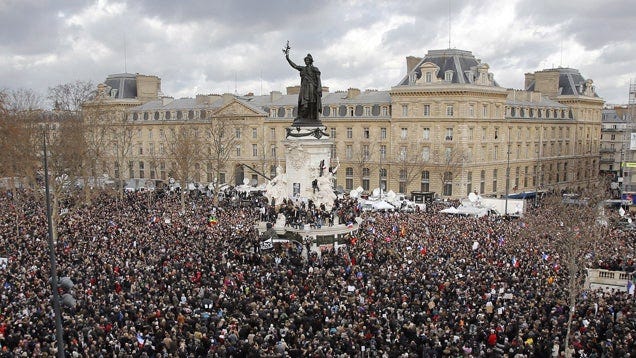Freedom - Parish Magazine for February 2015
The shooting of 12 people in the offices of the French satirical magazine ‘Charlie Hebdo’ has been in the news a lot recently. The terrorists responsible are reported to have been shouting that the attack was revenge for a cartoon that the magazine had published of the Prophet Muhammad.

There was swift and unanimous response from people, organisations and nations all over the world condemning the violence. And it was great to see the peaceful and defiant response at the Unity march when 1.6 million people from many races, nations and faiths (including many Muslims) took to the streets of Paris in defiance of the violence. One French official said that people were marching for ‘tolerance and co-existence.’
The Muslim councils of Great Britain and France were amongst the organisations that condemned the violence and many individual Muslims around the world have also publicly denounced the attacks in Paris as wrong and completely un-Islamic.
The brutal actions of these terrorists has been seen by many commentators as an attack against free speech. The argument is that the freedom of expression that we enjoy in our society means that the editors of Charlie Hebdo magazine have the right to say/draw/depict whatever they want in their publication without fear of a violent response.
The violent reaction to the publication cannot be justified. However, at the risk of being controversial, I wonder if the initial (and subsequent) publication of the ‘offending’ cartoons can be justified under the banner of ‘free speech’.
How would you define freedom?... A lack of physical restraint... exemption from external control... power to determine your own actions... power to make your own choices? Can you be free if there are limits to that freedom? The answer, I think, is ‘Yes.’

I am free to drive anywhere I want to in the country… provided that I follow the Highway Code. The Highway Code is a set of rules we agree to follow so that we can all use our roads safely without fear of pile-ups every time we go out on a journey. There is great freedom in being able to travel where we wish, but it only works if we respect the limits of that freedom and follow the rules.
I am free to say anything I want to someone else, or about someone else, whether or not it is true, but that does not mean that I should. There are rules or values (many unwritten) that govern how we should interact with other people around us if we want to avoid having ‘pile-ups’ in our relationships.
I believe that good satirical comment on politics, faith, companies, society, public figures, etc can be a very powerful way of highlighting hypocrisy, vices, follies and shortcomings in a way which can help bring about change. But when does satire just become an excuse for mockery, or freedom of speech an excuse to persecute someone different to ourselves?
To paraphrase Spiderman’s uncle Ben ‘With great freedom comes great responsibility.’ If we were more focused on our responsibilities to our fellow human beings than on our freedoms, then society would be a lot richer.
As St Paul wrote in his letter to the churches in Galatia:
It is absolutely clear that God has called you to a free life. Just make sure that you don’t use this freedom as an excuse to do whatever you want to do and destroy your freedom. Rather, use your freedom to serve one another in love; that’s how freedom grows. For everything we know about God’s Word is summed up in a single sentence: Love others as you love yourself. That’s an act of true freedom. If you bite and ravage each other, watch out—in no time at all you will be annihilating each other, and where will your precious freedom be then?
(Galatians 5:13-15, The Message)
I hope as we, rightly, condemn anyone using terrorism or violence that we would also be mindful of our responsibilities in our homes, our communities, our nation and our world to work for peace and understanding, rather than fuelling conflict in the name of freedom.
Rev Barry Jackson



